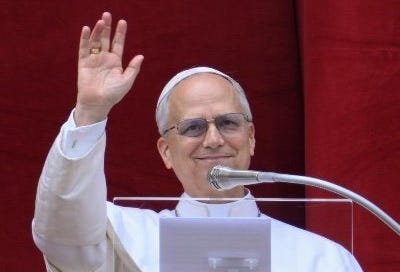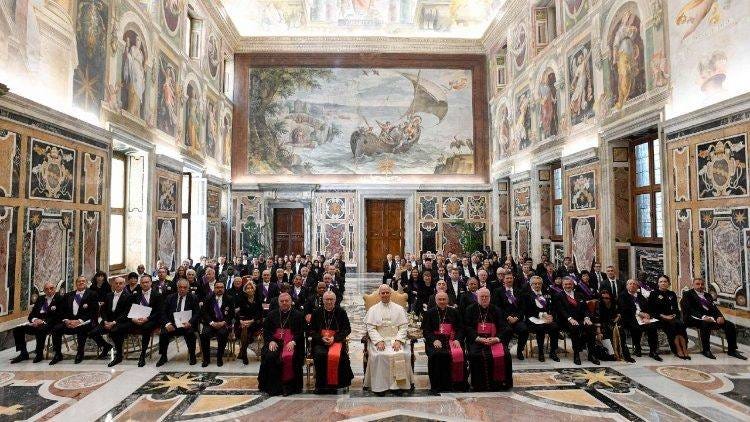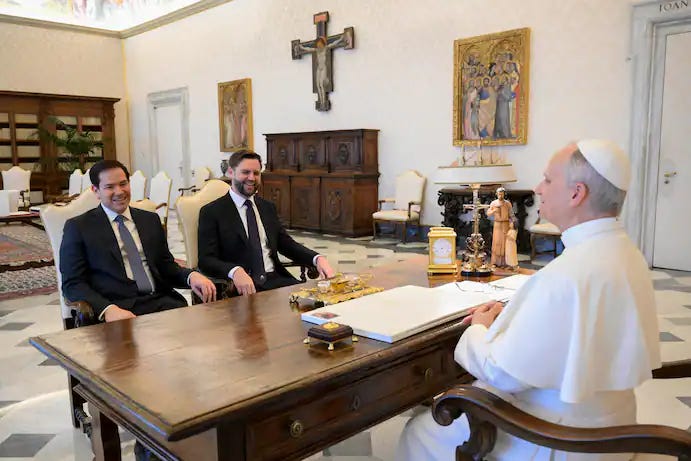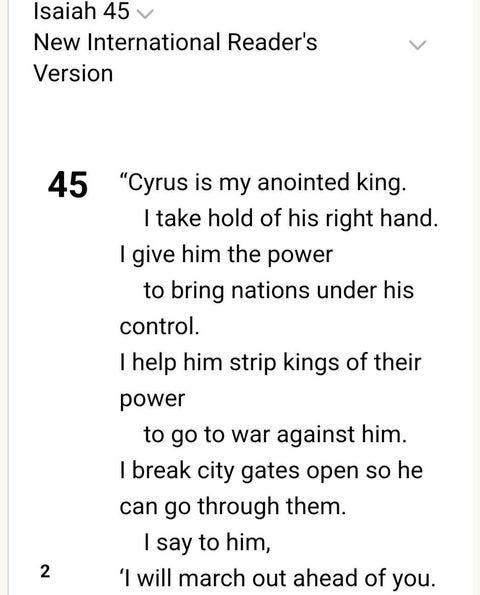I'm working on an in-depth newsletter about the new Pope that I plan to release after his inauguration tomorrow. The Mass for the inauguration of Pope Leo XIV’s pontificate will be celebrated on Sunday, May 18, at 10 a.m. Rome time in St. Peter’s Square. The liturgy will mark the official beginning of his ministry as successor of Peter and bishop of Rome.
Much has been speculated about Pope Leo XIV (Robert Francis Prevost) based on his past. I intend to look at what he has done and said since he became Pope - I'm more interested in his current actions - rather than his past deeds or words. I'm also interested in his direct words - not the way the fake news may spin them.
I'm not Catholic, but I am a Christian, and I want to understand why God chose this man to lead 1.4 BILLION baptized Catholics around the world.
Here are some of his statements on his Twitter (X) account since he was elected:
"War is never inevitable. Weapons can and must fall silent, for they never solve problems but only intensify them. Those who sow peace will endure throughout history, not those who reap victims.
There is so much violence and so many wars in our world! Amid this horror that should provoke outrage—as people die in the name of military conquest—stands the call of Christ, who repeats: ‘Peace be with you!’
The Holy See is willing to help enemies meet, so they may look each other in the eye and so people may be given back the dignity they deserve: the dignity of peace. With heart in hand, I say to the leaders of nations: let us meet; let us dialogue; let us negotiate!"
Here are excerpts from his recent speech to the Diplomatic Corp:
"I would like us to keep in mind three essential words that represent the pillars of the Church’s missionary activity and the aim of the Holy See’s diplomacy.
The first word is peace. All too often we consider it a “negative” word, indicative only of the absence of war and conflict, since opposition is a perennial part of human nature, frequently leading us to live in a constant “state of conflict” at home, at work and in society. Peace then appears simply as a respite, a pause between one dispute and another, given that, no matter how hard we try, tensions will always be present, a little like embers burning beneath the ashes, ready to ignite at any moment.
From a Christian perspective – but also in other religious traditions – peace is first and foremost a gift. It is the first gift of Christ: “My peace I give to you” (Jn 14:27). Yet it is an active and demanding gift. It engages and challenges each of us, regardless of our cultural background or religious affiliation, demanding first of all that we work on ourselves. Peace is built in the heart and from the heart, by eliminating pride and vindictiveness and carefully choosing our words. For words too, not only weapons, can wound and even kill.
In this regard, I believe that religions and interreligious dialogue can make a fundamental contribution to fostering a climate of peace. This naturally requires full respect for religious freedom in every country, since religious experience is an essential dimension of the human person. Without it, it is difficult, if not impossible, to bring about the purification of the heart necessary for building peaceful relationships.
This effort, in which all of us are called to take part, can begin to eliminate the root causes of all conflicts and every destructive urge for conquest. It demands a genuine willingness to engage in dialogue, inspired by the desire to communicate rather than clash.
As a result, there is a need to give new life to multilateral diplomacy and to those international institutions conceived and designed primarily to remedy eventual disputes within the international community. Naturally, there must also be a resolve to halt the production of instruments of destruction and death, since, as Pope Francis noted in his last Urbi et Orbi Message: No peace is “possible without true disarmament [and] the requirement that every people provide for its own defence must not turn into a race to rearmament.”
The second word is justice. Working for peace requires acting justly. As I have already mentioned, I chose my name thinking first of all of Leo XIII, the Pope of the first great social Encyclical, Rerum Novarum. In this time of epochal change, the Holy See cannot fail to make its voice heard in the face of the many imbalances and injustices that lead, not least, to unworthy working conditions and increasingly fragmented and conflict-ridden societies. Every effort should be made to overcome the global inequalities – between opulence and destitution – that are carving deep divides between continents, countries and even within individual societies.
It is the responsibility of government leaders to work to build harmonious and peaceful civil societies. This can be achieved above all by investing in the family, founded upon the stable union between a man and a woman, “a small but genuine society, and prior to all civil society.”
In addition, no one is exempted from striving to ensure respect for the dignity of every person, especially the most frail and vulnerable, from the unborn to the elderly, from the sick to the unemployed, citizens and immigrants alike.
My own story is that of a citizen, the descendant of immigrants, who in turn chose to emigrate. All of us, in the course of our lives, can find ourselves healthy or sick, employed or unemployed, living in our native land or in a foreign country, yet our dignity always remains unchanged: it is the dignity of a creature willed and loved by God.
The third word is truth. Truly peaceful relationships cannot be built, also within the international community, apart from truth. Where words take on ambiguous and ambivalent connotations, and the virtual world, with its altered perception of reality, takes over unchecked, it is difficult to build authentic relationships, since the objective and real premises of communication are lacking.
For her part, the Church can never be exempted from speaking the truth about humanity and the world, resorting whenever necessary to blunt language that may initially create misunderstanding. Yet truth can never be separated from charity, which always has at its root a concern for the life and well-being of every man and woman. Furthermore, from the Christian perspective, truth is not the affirmation of abstract and disembodied principles, but an encounter with the person of Christ himself, alive in the midst of the community of believers.
Truth, then, does not create division, but rather enables us to confront all the more resolutely the challenges of our time, such as migration, the ethical use of artificial intelligence and the protection of our beloved planet Earth. These are challenges that require commitment and cooperation on the part of all, since no one can think of facing them alone."
People say the position of the Pope isn't political - but that's not true. People say faith and religion isn't political, but that's not true, either. Politics defines the way that groups of humans live with each other and the moral code we live by. Politics and faith influence the way we vote and the leaders we choose and the decisions we make. ALL choices are intertwined with faith and religion or the lack thereof - there is no way around it. That’s why I’m interested in what the Pope has to say and how he will lead.
Here is the full text of Pope Leo XIV’s homily from Inauguration Mass: ‘This Is the Hour for Love’
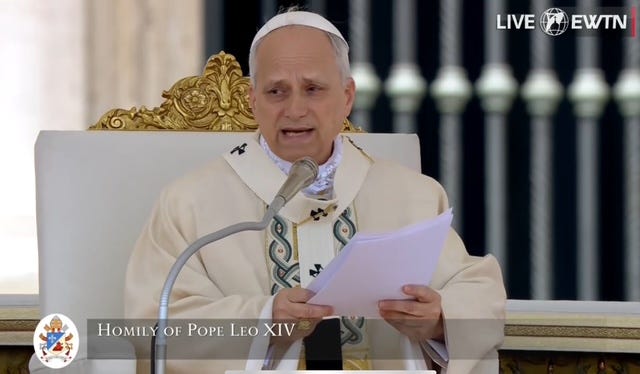
“Dear Brother Cardinals, Brother Bishops and Priests, Distinguished Authorities and Members of the Diplomatic Corps, and those who traveled here for the Jubilee of Confraternities, Brothers and Sisters:
I greet all of you with a heart full of gratitude at the beginning of the ministry that has been entrusted to me. St. Augustine wrote: “Lord, you have made us for yourself, and our heart is restless until it rests in you” (Confessions, I: 1,1).
In these days, we have experienced intense emotions. The death of Pope Francis filled our hearts with sadness. In those difficult hours, we felt like the crowds that the Gospel says were “like sheep without a shepherd” (Matthew 9:36).
Yet on Easter Sunday, we received his final blessing and, in the light of the Resurrection, we experienced the days that followed in the certainty that the Lord never abandons his people, but gathers them when they are scattered and guards them “as a shepherd guards his flock” (Jeremiah 31:10).
In this spirit of faith, the College of Cardinals met for the conclave. Coming from different backgrounds and experiences, we placed in God’s hands our desire to elect the new Successor of Peter, the Bishop of Rome, a shepherd capable of preserving the rich heritage of the Christian faith and, at the same time, looking to the future, in order to confront the questions, concerns and challenges of today’s world.
Accompanied by your prayers, we could feel the working of the Holy Spirit, who was able to bring us into harmony, like musical instruments, so that our heartstrings could vibrate in a single melody. I was chosen, without any merit of my own, and now, with fear and trembling, I come to you as a brother, who desires to be the servant of your faith and your joy, walking with you on the path of God’s love, for he wants us all to be united in one family.
Love and unity: These are the two dimensions of the mission entrusted to Peter by Jesus. We see this in today’s Gospel, which takes us to the Sea of Galilee, where Jesus began the mission he received from the Father: to be a “fisher” of humanity in order to draw it up from the waters of evil and death. Walking along the shore, he had called Peter and the other first disciples to be, like him, “fishers of men.”
Now, after the Resurrection, it is up to them to carry on this mission, to cast their nets again and again, to bring the hope of the Gospel into the “waters” of the world, to sail the seas of life so that all may experience God’s embrace.
How can Peter carry out this task? The Gospel tells us that it is possible only because his own life was touched by the infinite and unconditional love of God, even in the hour of his failure and denial. For this reason, when Jesus addresses Peter, the Gospel uses the Greek verb agapáo, which refers to the love that God has for us, to the offering of himself without reserve and without calculation. Whereas the verb used in Peter’s response describes the love of friendship that we have for one another.
Consequently, when Jesus asks Peter, “Simon, son of John, do you love me more than these?” (John 21:16), he is referring to the love of the Father. It is as if Jesus said to him, “Only if you have known and experienced this love of God, which never fails, will you be able to feed my lambs. Only in the love of God the Father will you be able to love your brothers and sisters with that same ‘more,’ that is, by offering your life for your brothers and sisters.”
Peter is thus entrusted with the task of “loving more” and giving his life for the flock. The ministry of Peter is distinguished precisely by this self-sacrificing love, because the Church of Rome presides in charity, and its true authority is the charity of Christ. It is never a question of capturing others by force, by religious propaganda, or by means of power. Instead, it is always and only a question of loving as Jesus did.
The Apostle Peter himself tells us that Jesus “is the stone that was rejected by you, the builders, and has become the cornerstone” (Acts 4:11). Moreover, if the rock is Christ, Peter must shepherd the flock without ever yielding to the temptation to be an autocrat, lording it over those entrusted to him (cf. 1 Peter 5:3).
On the contrary, he is called to serve the faith of his brothers and sisters and to walk alongside them, for all of us are “living stones” (1 Peter 2:5), called through our baptism to build God’s house in fraternal communion, in the harmony of the Spirit, in the coexistence of diversity. In the words of St. Augustine: “The Church consists of all those who are in harmony with their brothers and sisters and who love their neighbour” (Sermons 359, 9).
Brothers and sisters, I would like that our first great desire be for a united Church, a sign of unity and communion, which becomes a leaven for a reconciled world. In our time, we still see too much discord, too many wounds caused by hatred, violence, prejudice, the fear of difference, and an economic paradigm that exploits the Earth’s resources and marginalizes the poorest.
For our part, we want to be a small leaven of unity, communion and fraternity within the world. We want to say to the world, with humility and joy: Look to Christ! Come closer to him! Welcome his word that enlightens and consoles! Listen to his offer of love and become his one family: In the one Christ, we are one. This is the path to follow together, among ourselves, but also with our sister Christian churches, with those who follow other religious paths, with those who are searching for God, with all women and men of goodwill, in order to build a new
world where peace reigns!
This is the missionary spirit that must animate us; not closing ourselves off in our small groups, nor feeling superior to the world. We are called to offer God’s love to everyone, in order to achieve that unity that does not cancel out differences but values the personal history of each person and the social and religious culture of every people.
Brothers and sisters, this is the hour for love! The heart of the Gospel is the love of God that makes us brothers and sisters. With my predecessor Leo XIII, we can ask ourselves today: If this criterion “were to prevail in the world, would not every conflict cease and peace return?” (Rerum Novarum, 21).
With the light and the strength of the Holy Spirit, let us build a Church founded on God’s love, a sign of unity, a missionary Church that opens its arms to the world, proclaims the word, allows itself to be made “restless” by history, and becomes a leaven of harmony for humanity. Together, as one people, as brothers and sisters, let us walk towards God and love one another.”
Here's a recap of some of the more interesting conversations I've had with people lately about faith & politics.
"I am a Christian but I don't do politics and I don't vote."
"I am a protestant and a woman who wants to become a leader in the church. I don't like Trump and I don't like Catholics and I don't tithe but I'd like to tell YOU what to do. I may vote for Kamala because she's a woman."
"I am a Catholic and I believe that you aren't a real Christian unless you are Catholic."
"I'm an atheist but I align most closely with the views of Pope Francis."
"I'm a Christian conservative pastor but I don't talk politics from the pulpit because my wife and many women in my congregation don't like Trump and I don't want to deal with their wrath."
"I am a protestant conservative and I don't care what Catholics think."
Well, JD Vance & Marco Rubio and Ron DeSantis are ALL CATHOLICS and are the leading contenders for President of the United States in 2028. Vance & Rubio met with the Pope at the Vatican after his inauguration.
It matters what the Pope says. It matters how Christians vote. Politics and faith can NOT be separated no matter how much we try to spin it that way.
Why don't more Christians vote?
I’ve only been involved in “politics” for the past 9 years. Before that, I paid little attention to what was going on in DC. I voted Republican because my Dad did. That’s about it.
My work is free and supported by your generous donations. Thank you to all who have donated in the past. I truly appreciate your generosity!
If you like my work, you can fund me by becoming a paid subscriber on Substack, donate by credit card here or you can send me a check to Peggy Tierney, PO Box 242, Spooner, Wisconsin 54801- or just send me a note or a card! I love hearing from you.
